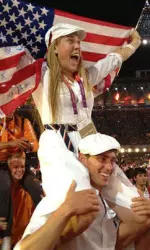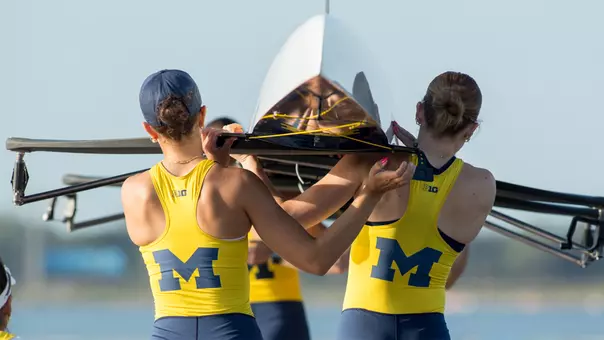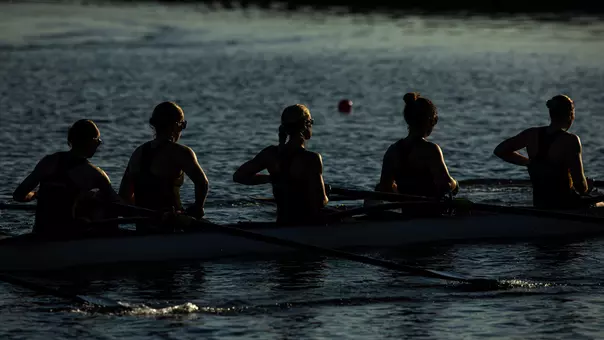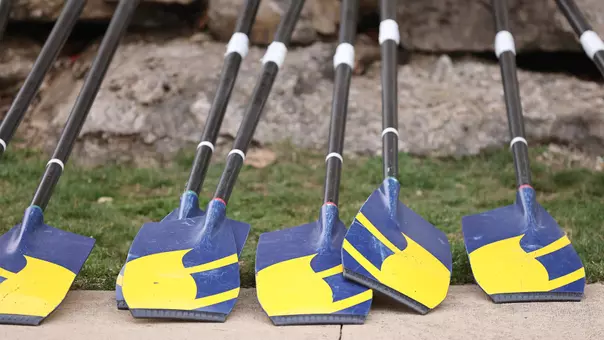
Future Friday: Q&A with Sarah Trowbridge
2/26/2016 12:00:00 AM | Rowing
Feb. 26, 2016

After representing the block M with pride while they competed for the Maize and Blue, our student-athlete alumni have gone off to become professionals in different areas of their lives. Whether they continued on in their sport, helped to build up a company or started a family, they are building a future. They are building our future. As they leave the University of Michigan campus they go forth with all they learned here to create a better future for us all.
Sarah Trowbridge (2002-05) helped lead the Michigan rowing team to back-to-back Big Ten championships and top-five finishes at the NCAA Championships in 2003 (4th) and 2004 (3rd). After graduating from Michigan with an English degree in 2006, Trowbridge continued to row competitively, winning gold in the double sculls at the 2007 Pan American Games. A decorated international career culminated in her qualification for the 2012 London Olympic Games after winning the double sculls event at the 2012 Final Olympic Qualification Regatta. Paired with Ohio State Buckeye Margot Shumway, the double sculls crew qualified for the Olympic final and finished in sixth place.
After serving as an assistant coach at Yale, Trowbridge returned to USRowing as a coach. She is currently preparing the women's double sculls crew, including Michigan alumna Ellen Tomek ('06), for Olympic Trials that will run April 21-24 in Sarasota, Florida.
Q. Since you graduated Michigan in 2006, you've continued to be involved as an athlete and now as a coach. Talk about your current role with USRowing.
Right now I'm coaching a potential 2016 Olympic Women's Double after coaching a Men's Pair at the 2015 World Championships last summer. What's cool is that I overlapped with both of these women when I was on the national team. What's cooler is that 50 percent of the boat went to Michigan!
Q. Four years ago you were preparing for 2012 Olympics. How is it different now as a coach?
There are some similarities in that you're acutely aware of how you must win trials or selection to actually go to the Olympics, and that precondition is always in your mind. The differences are that you can work on improving every area of the performance, but you actually can't go out and ensure that the work is utilized in the performance. You have no control once the athletes shove from the dock. The other biggest difference is that I can drink coffee throughout practice and not just around practice.
Q. Your husband is also a coach and a Buckeye. How is that dynamic?
He is a Buckeye!?! That's news to me; where do I sign the annulment? For real though, I think the coaching dynamic is fantastic and one that's really helped even when I've coached collegiately as well as nationally. And the relationship is better than you'd expect when you work in close quarters all hours of the day and then still have to go home together (but that's probably because he went to culinary school and makes great dinners once we get home). As for him being a Buckeye, and a homegrown Ohioan, I really appreciate having the Midwest mentality of work ethic, grit, integrity, and a strong support system that was similar to what I found amongst my teammates and academic community at Michigan.
Q. What have you enjoyed so far the most of your experiences outside of rowing since graduating Michigan?
Well, since I trained for six years and coached for six years (some of those overlapped, I'm not that old) many of my major experiences are usually entwined with rowing. But one thing I've enjoyed the most since being an undergraduate has been the amount of travel I've done, with great friends, my husband, as a team, or even on my own. Last year I drove over 2,000 miles around Europe by myself, which is a rare opportunity to have. I really enjoy time in foreign places with foreign cultures and reflecting about where I come from and what it is to be an American.
Q. How much did your experience at Michigan shape your coaching style and who you've become today?
How much? It impacted every aspect of my coaching and certainly who I became after I graduated. It probably impacted me more post-graduation than post-matriculation. And in the ways it didn't directly shape my coaching style, my time at Michigan was the ground on which those things grew and developed to form my own coaching voice and philosophy. In what ways did Michigan shape me? The precision and sense of urgency Mark Rothstein, Emily Ford, and Mike Caviston brought to each practice and then each element of rowing really stuck with me. I also felt the coaches' respect for the athletes (as individuals and as a team) as well as for each other were important pillars of the program.
Q. What was your favorite memory rowing at Michigan?
Oh boy! Seriously, a favorite? I don't know if it's races won, records broken, team parties thrown, or dumb moments of hilarity with the girls. I would probably say it would have to be the scream-cry-laughter that had us bent over for minutes when we'd say, see, or hear something funny with our teammates. That or when we the team of '04 set the venerable and exalted "Wires to Peninsula" record, which is still held today (gauntlet thrown).
Q. If you could give one piece of advice to incoming freshmen at U-M what would it be?
Don't coast, don't squander, and don't believe the limits you or others have placed on yourselves. Oh wait, part of my coaching style involves doing vs. not doing. Have fun! Be aware that your intentions may not be reflected in your actions, and then correct your actions.
The 2015-16 academic year marks the 150th anniversary of Michigan Athletics. We invite the University of Michigan family to celebrate the passion that fuels us, rediscover the stories and traditions that unite us, and imagine what the future holds for us. We look forward to celebrating "This Michigan of Ours." To share a memory of Michigan Athletics, please fill out our online form or email goblue150@umich.edu.










